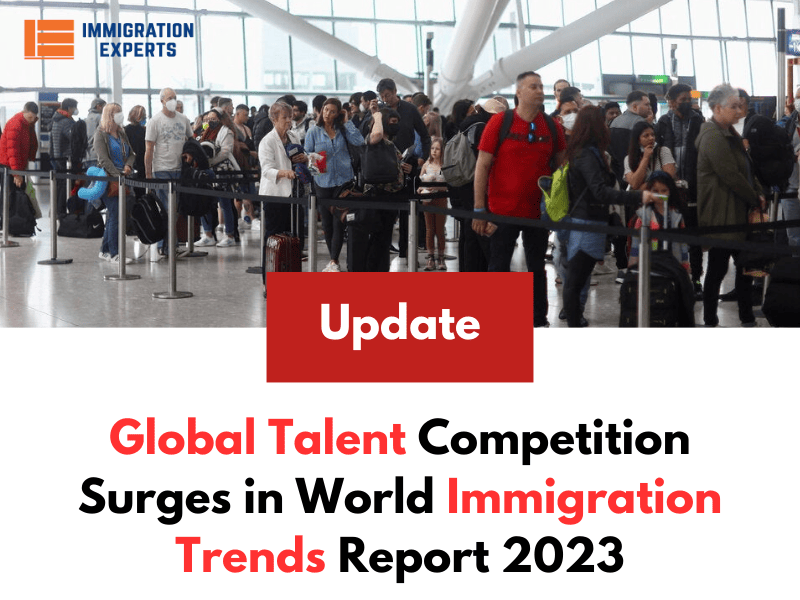051 8439995, 042 35911332

Because of the increased need for highly educated individuals, hybrid job options, and a more discriminating workforce, the immigration landscape is developing to fit the changing work environment.
The major causes for the transformation of the immigration trends, according to the Fragomen Worldwide Immigration Trends Report 2023, are the impacts of the Ukrainian war, a reduction in restrictive COVID-19 rules, an economic crisis, and fierce global competition for talent.
Lunga Mani, a Practise Leader for Sub-Saharan Africa, emphasizes the rising issues in the workplace, particularly in developing countries. To address future skill shortages, he emphasizes the need for both nurturing local talent pools and streamlining the process of embracing overseas talent.
The report emphasized the creation of new opportunities for highly trained personnel, both inside and outside of the developing world.
Things You Will Find In This Page
Global Immigration Trends in 2022
According to the report, “there was a noticeable trend towards simplified and more lenient immigration regulations worldwide in 2022.” These improvements were made to make commercial and work-related travel easier and to attract international personnel. In addition, there has been a progressive increase in avenues for highly trained persons. These policy modifications accord with the company objective of proactively tackling looming difficulties.”

This current legal trend, together with the relaxation of COVID-19 travel restrictions, is sparking the development of new approaches for controlling migratory trends. Nonetheless, it appears that two separate techniques for this regulation exist. The article cites instances of some nations introducing somewhat harsher travel conditions (such as Qatar’s Hayya card for the 2022 FIFA World Cup), while others (such as Saudi Arabia) are reducing restrictions to attract more tourists and enhance tourism revenue.
The World is Addressing New Visa Pathways to Fulfill Skill Shortage
The research demonstrates a serious dichotomy in work-related immigration trends. Despite falling unemployment rates in numerous nations, there are a record amount of job openings. This is especially evident in IT, Sales & Marketing, Operations & Logistics, Manufacturing & Production, and Customer Facing professions.

The report states, “The shortage of workers and skills is having a significant impact on global economies, and immigration policy is emerging as a key solution to address this issue.”
New visa pathways are opening up throughout the world to address regional talent shortages. However, by making immigration procedures easier, the danger of major brain drain across multiple industries becomes a genuine problem.
Remote Work and Digital Nomad Trends
Internet platforms and remote work permits are becoming more available to persons who are capable of working remotely. This means that even if a highly trained individual remains in a nation, their experience may be used abroad, potentially resulting in a sort of skill export.
The number of nations that provide remote work and digital nomad visas is growing. These rules are currently in existence in at least 36 nations. Such programs have been implemented in African nations such as Mauritius and Namibia, and South Africa is exploring them as well.

Nonetheless, the digital nomad trend has brought to light issues about the digital gap in underdeveloped countries. Those who have access to the internet, the required technology, and better infrastructure have more chances, both on and off the world stage, than those who have not. Mani emphasizes this remark.
Despite these obstacles, more than half of the world’s population is likely to have internet access within the next twenty years, according to the research. This highlights the growing significance of improving digital skills for governments, corporations, and individuals. While the engagement of the government is critical in bridging this skills gap, companies must also help by investing in online learning opportunities to bridge both existing and growing digital inequalities among their workforce.
Final Words
The changing immigration landscape, influenced by factors like the Ukrainian conflict and global talent competition, is opening new opportunities for skilled workers.
Remote work and digital nomadism are gaining ground, but they expose a digital divide. Access to technology and infrastructure is vital for success.
Despite declining unemployment rates, job openings remain unfilled, especially in key sectors. Immigration policies are emerging as solutions.
In the next decades, internet access will expand, highlighting the importance of digital skills. Governments and businesses must invest in online learning to bridge the digital gap and create a more equitable workforce.
✅Subscribe to our YouTube Channel and Facebook Page to get the latest updates on Immigration, Student Visas, Visit Visas, and Online Businesses
⭕ www.youtube.com/rizwanulhaque22
⭕ www.facebook.com/rizwanulhaque22
